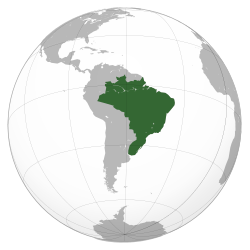Empire of Brazil
| Empire of Brazil | ||||||||||||||
| Império do Brasil | ||||||||||||||
|
||||||||||||||
|
||||||||||||||
|
Motto Independência ou Morte! "Independence or Death!" |
||||||||||||||
|
Anthem Hino da Independência (1822–1831) "Anthem of Independence" Hino Nacional Brasileiro (1831–1889) "Brazilian National Anthem" |
||||||||||||||
|
Empire of Brazil at its largest territorial extent, 1822–1828, including former Cisplatina province
|
||||||||||||||
| Capital | Rio de Janeiro | |||||||||||||
| Languages | Portuguese | |||||||||||||
| Religion | Roman Catholic | |||||||||||||
| Government | Constitutional monarchy | |||||||||||||
| Emperor | ||||||||||||||
| • | 1822–1831 | Pedro I | ||||||||||||
| • | 1831–1889 | Pedro II | ||||||||||||
| Prime Minister | ||||||||||||||
| • | 1843–1844 | Marquis of Paraná (de facto) | ||||||||||||
| • | 1847–1848 | 2nd Viscount of Caravelas (office created) | ||||||||||||
| • | 1889 | Viscount of Ouro Preto (last) | ||||||||||||
| Legislature | General Assembly | |||||||||||||
| • | Upper house | Senate | ||||||||||||
| • | Lower house | Chamber of Deputies | ||||||||||||
| Historical era | 19th century | |||||||||||||
| • | Independence | 7 September 1822 | ||||||||||||
| • | Accession of Pedro I | 12 October 1822 | ||||||||||||
| • | Adoption of the Empire's Constitution | 25 March 1824 | ||||||||||||
| • | Accession of Pedro II | 7 April 1831 | ||||||||||||
| • | Abolition of slavery | 13 May 1888 | ||||||||||||
| • | Monarchy abolished | 15 November 1889 | ||||||||||||
| Area | ||||||||||||||
| • | 1889 | 8,363,186 km² (3,229,044 sq mi) | ||||||||||||
| Population | ||||||||||||||
| • | 1823 est. | 4,000,000 | ||||||||||||
| • | 1854 est. | 7,000,700 | ||||||||||||
| • | 1872 est. | 9,930,479 | ||||||||||||
| • | 1890 est. | 14,333,915 | ||||||||||||
| Currency | Real | |||||||||||||
|
||||||||||||||
The Empire of Brazil was a 19th-century state that broadly comprised the territories which form modern Brazil and Uruguay. Its government was a representative parliamentary constitutional monarchy under the rule of Emperors Dom Pedro I and his son Dom Pedro II. A colony of the Kingdom of Portugal, Brazil became the seat of the Portuguese colonial Empire in 1808, when the Portuguese Prince regent, later King Dom João VI, fled from Napoleon's invasion of Portugal and established himself and his government in the Brazilian city of Rio de Janeiro. João VI later returned to Portugal, leaving his eldest son and heir, Pedro, to rule the Kingdom of Brazil as regent. On 7 September 1822, Pedro declared the independence of Brazil and, after waging a successful war against his father's kingdom, was acclaimed on 12 October as Pedro I, the first Emperor of Brazil. The new country was huge but sparsely populated and ethnically diverse.
Unlike most of the neighboring Hispanic American republics, Brazil had political stability, vibrant economic growth, constitutionally guaranteed freedom of speech, and respect for civil rights of its subjects, albeit with legal restrictions on women and slaves, the latter regarded as property and not citizens. The empire's bicameral parliament was elected under comparatively democratic methods for the era, as were the provincial and local legislatures. This led to a long ideological conflict between Pedro I and a sizable parliamentary faction over the role of the monarch in the government. He faced other obstacles. The unsuccessful Cisplatine War against the neighboring United Provinces of the Río de la Plata in 1828 led to the secession of the province of Cisplatina (later to become Uruguay). In 1826, despite his role in Brazilian independence, he became the king of Portugal; he immediately abdicated the Portuguese throne in favor of his eldest daughter. Two years later, she was usurped by Pedro I's younger brother Miguel. Unable to deal with both Brazilian and Portuguese affairs, Pedro I abdicated his Brazilian throne on 7 April 1831 and immediately departed for Europe to restore his daughter to the Portuguese throne.
...
Wikipedia



